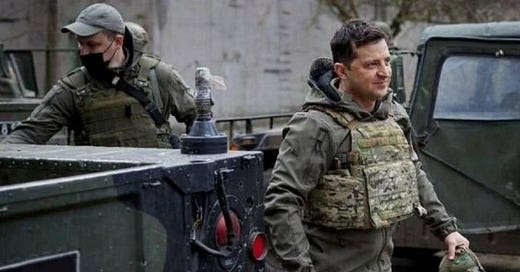#9 - War in Ukraine. When OSINT is part of the narrative
Truth is the first casualty in war.
Vladimir Putin ordered the morning of February 24th a blitzkrieg-like operation to conquer and control Ukraine. A full-scale invasion of one the largest countries in Europe by land, air, and sea. Russian missiles started to rain down in military facilities first and cities afterward. Then the 150.000 soldiers surrounding the country crossed the borders with an estimated 2.840 battle tanks, outnumbering Ukraine’s armored capability by three to one. Their primary objective was to advance towards Kyiv and establish a puppet government as the former Soviet Union did.
But things are not going as Putin expected. And everybody is watching it in real-time.
The Ukrainian President Volodymyr Zelensky broadcasts messages to his country and the world through social networks, encouraging them to resist and fight the invader.
At the same time, citizens and soldiers are recording with their mobile phones how they stand up against the Russian Army. Short stories of heroic and brave people fighting against a mighty army retweeted by thousands of people worldwide, and watched by millions instantly on their screens. Thanks to all the open sources of information, they are creating a narrative as it happens in front of our eyes.
In the first 24 hours, we have heard of (and seen) stories about The Ghost of Kyiv, a now-legendary pilot who took down six Russian planes. Vitaly Skakun, a Ukrainian marine who blew himself up with a bridge near the city of Henicheskto halt the enemy. The Klitschko brothers dress in camouflage defending the capital, the soldiers of Snake Island telling the Russian Army to fuck-off before being killed by the bombings. Are they true? It does not matter. Ukrainians need a narrative to keep the morale high and that’s exactly what they need. Propaganda it’s part of the intel of any conflict. Now it’s easier; the story telling is a question of cherrypicking the best content uploaded to the social networks.
As a side effect, people worldwide buy the narrative and empathize with the cause. And lots of OSINT enthusiasts analyze and scrutinize every single movement of the troops thanks to the information shared in social networks. Sometimes the information provided is so accurate that they have to stop giving intel about the location of the Ukrainian forces to hide this information from the enemy.
In the last 24 hours, we have seen a change in the information obtained and distributed through these OSINT channels: The Russian Army is not moving as fast as expected, and the Ukrainian resistance is strong and fierce. Stories like the hospitals accepting Russian soldiers or Russian forces failing capture our attention in our timelines. Now we are all wondering if the Russian Army is a paper tiger. Again the narrative.
In contrast, during the first 24 hours, the information given by the Kremlin was only the official version. There was an incredible unbalance in the information flow.
One thing that shocked me is: why the Russians did not destroy the Telco infrastructures of the country? Did they think that the operation would be so fast that they did not need to take control of the country’s Telecommunications? Maybe. But yesterday, the Roskomnadzor (the Russian agency responsible for monitoring, controlling, and censoring mass media) blocked Twitter’s access and restricted Meta’s access in Russia. It’s a fascinating strategic situation; Russia blocks social media in Russia (Twitter and Meta) but allows it to flow out of and inside Ukraine. Russia is not winning the war and has lost control of the narrative.
It seems Putin’s plan A -a blitzkrieg-like operation- has failed. And he probably has a Plan B, C, D, and even Z because of the asymmetry of the forces. But a total war against the “Ukrainian Slavic brothers” could be a disaster for his reputation in Russia. Urban warfare would be a butchery and the destruction of the infrastructures of the country has a costly reconstruction bill.
Is it time to negotiate an honorable surrender for Zelensky? Or get ready for a long deployment like Irak? Is this the beginning of the end of Putin’s regime? Time will tell.
The Music Snippet
I can’t think of a better metal band to fight a war.



